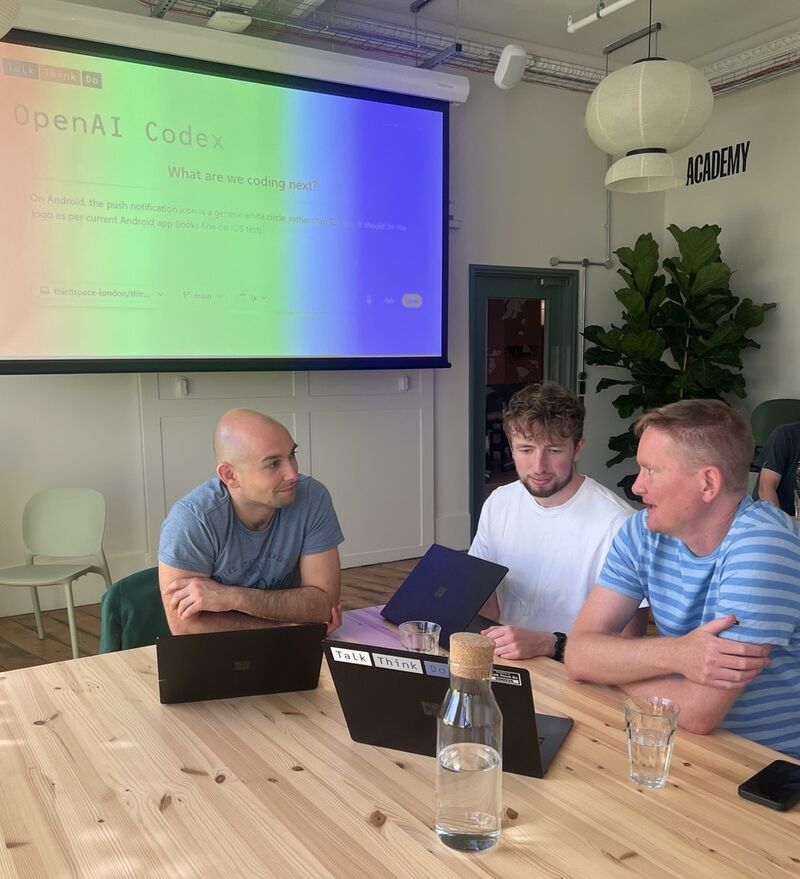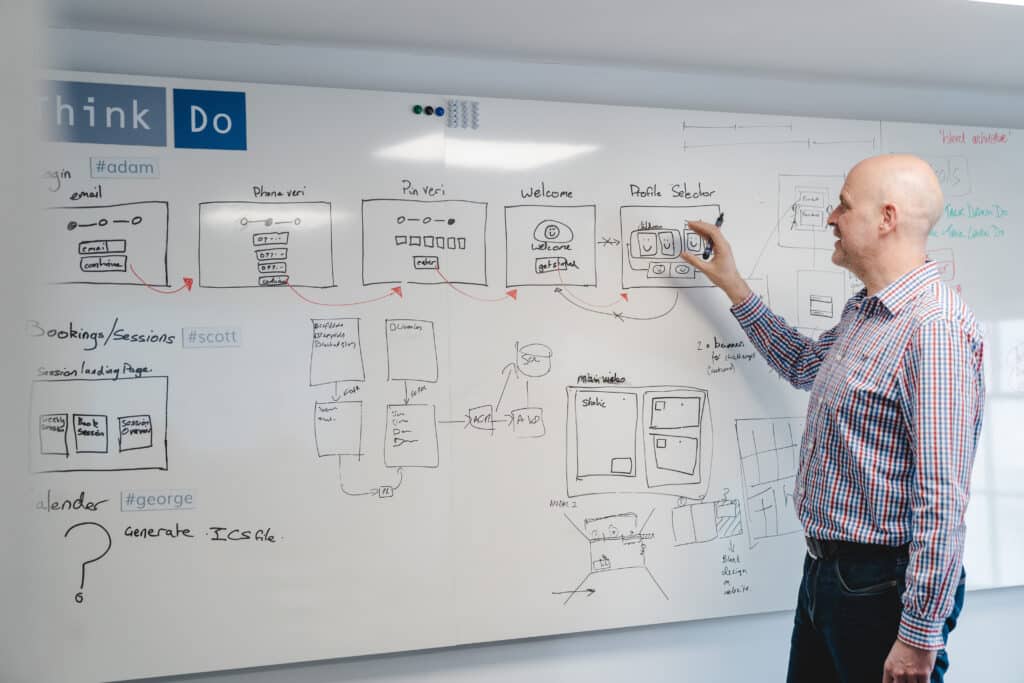Why Your Business Should Modernise its Legacy Systems

In a world defined by technological disruption, businesses that resist change are at a significant disadvantage compared to those that embrace it. You could have the most talented team, selling the best products, but if your tech is outdated, you’ll inevitably be held back.
Staying ahead of the curve isn’t about jumping on the latest technological bandwagon. It’s about having applications that work — applications that meet needs and are able to scale in line with your business.
Today’s customers are tech-savvy. They expect seamless, hassle-free interactions with technology. They know legacy applications when they see them. If you can’t offer the smooth experience they expect, they’ll look for a competitor that can.
In addition to customer-facing applications, it’s also critical to modernise the legacy systems you use internally. In a rapidly changing world, outdated tech makes it virtually impossible to be a successful digital business. This need is heightened with the shift to hybrid and remote work, as global teams are relying on your business applications to achieve mission-critical tasks.
But why should you really modernise your legacy systems? In this article, we’ll highlight some of the key reasons, as well as how you can ensure you get the most out of your applications long-term.
Suggested reading: Are you worried that legacy technology is holding your business back? We talk about this in more detail in our eBook, Legacy Systems are Costing Your Business’ Growth.
Improved response times
Customers expect applications that are fast and responsive. But legacy systems are typically slower to respond to the needs of users. As a result, your business is slower to provide services, which means a poor customer experience. The result, inevitably, is customer drop-off. This leads to a loss in revenue, makes it harder to achieve core business goals, and costs the organisation more money long-term as you pay to constantly resolve slow response times and bugs.
Beyond losing customers, slow response times lead to internal frustration, with your team stretched thin and struggling to keep everything working. Frustration leads to disengagement, which leads to low productivity. If your technology makes day-to-day work harder for employees, there’s no reason for them to stay.
Through systems modernisation and moving to cloud-based solutions, you can meet the needs of customers instantly. Not only does this lead to increased customer satisfaction but also improved employee morale. Technology partners, such as Talk Think Do, can develop cloud-native applications that take the strain away from internal teams to enable them to focus on improving the customer experience.
DevOps is a great way of modernising legacy systems to improve response times. By increasing the collaboration between software development and operations teams, you create a more efficient feedback loop.
Ultimately, DevOps improves response times while ensuring reliability and stability, reducing application downtime and making your applications more effective and scalable for the long term. DevOps is therefore an effective way of modernising legacy systems and ensuring that your technology stack is aligned with the needs of a growing business.
Further reading: We talk more about the continuing value of DevOps in our roundup from GitHub Universe 2022.
Heightened security
As our reliance on technology increases, so does the importance of security. Legacy systems are typically harder to secure, increasing the risk of data breaches, outages, and human error. Legacy systems no longer supported by their manufacturer could open you up to cyberattacks, even if they only contain one unpatched vulnerability. IBM estimates that the global average cost of a data breach is around $4.35 million.1 This is a scary number, as especially against the current economic backdrop that could be enough to cripple a business completely.
Transitioning to cloud-based applications largely solves these issues. The cloud’s ability to handle cybersecurity threats is unparalleled, especially when using highly trusted and reputable public clouds. Applications hosted on Microsoft Azure, for example, are extremely secure thanks to its four-layer security architecture.
Further, relying on a technology partner to modernise and manage your cloud-native applications for you can reduce the risk of future attacks. Talk Think Do offers Managed Application Support, which constantly reevaluates your applications to ensure they’re able to support you carrying out business-critical tasks. That includes reviewing and testing incident response and disaster recovery plans, so that you’re prepared for any future cyberattacks. That same IBM study found that teams who test their incident response plan ahead of time tend to save an average of $2.66 million in the event of an actual data breach.
As a result, modernised, cloud-native applications are far more secure and beneficial to your business. Heightened cloud security:
- Reduces application downtime, as there are fewer data breaches.
- Makes applications safer to use in a hybrid setting, as data is only provided to people with the right permissions.
- Takes the strain away from internal teams, as instead of constantly dealing with security issues they can focus on business-critical tasks.
- Helps your business grow, as secure, cloud-based applications are more easily scalable than legacy technology.
Pro tip: You can learn more about how Talk Think Do modernises legacy systems in our blog, 5 Steps to Migrating to Cloud Native Application Architectures.
Easier to update and maintain
Over time, applications need updates and ongoing maintenance. This is especially true if your business is growing fast. With legacy systems, it becomes increasingly difficult to keep up with the rate of technological change.
Of course, you can add another patch, but how long will that last? Eventually, there comes a tipping point where it becomes impossible to justify the cost, hassle, and ROI of keeping legacy systems going. Instead of kicking the can further down the road, smart companies know that modernising their existing legacy systems is the only way to move forward.
Unlike legacy tech, cloud-native applications are designed with modern technological needs in mind. Upgrading to cloud-based solutions not only improves performance and data security, but also future-proofs your organisation within an ever-changing technological environment.
Talk Think Do carefully evaluates how your applications are currently performing before the modernisation gets underway, and establishes exactly what architecture is needed to support your business. Having your applications built bespoke to your needs reduces the chance of incurring technical debt, all while ensuring your every need is met.
Microservices, which split up the cloud-native application into smaller, independent services, offer a range of benefits, including:
- If the one microservice needs maintenance, it can be managed without the rest of the application needing an upgrade.
- The application is more secure, as a data breach in one microservice wouldn’t affect the wider application.
- Microservices are reusable across the business, so a login option can be reused anywhere in the organisation that needs it without it having to be rebuilt.
As a result, cloud-native applications are a more cost-effective, efficient, and simple option for businesses when it comes to upgrades and maintenance. They improve operational efficiency, ensure application stability, and are a worthwhile long-term investment.
More optimised for hybrid work
The COVID-19 pandemic accelerated digital transformation worldwide, turning remote work from a nice-to-have perk into a necessity in a matter of months. Today, remote and hybrid work continue to be the norm in many industries.
While this shift has brought many benefits for businesses and employees alike, it has also raised many issues — technology being one of them. Legacy applications designed without hybrid work in mind make it more difficult to adapt, resulting in clunky performance, persistent issues, and reduced efficiency.
A key example of this is access to data. Traditional, on-premise architectures make data access very difficult in a hybrid setting. A team member sitting in Singapore should be able to access mission-critical information in order to get their work done. Even after migrating to the cloud, many businesses don’t place enough focus on how they evolve data storage to suit a hybrid setting, relying on tedious, outdated methods.
eCloud-based applications, on the other hand, are ideally suited to supporting a hybrid workforce by enabling data to be accessed from anywhere. They are also able to withstand high user volumes and spikes in activity. And, going back to the ever-pressing issue of security, cloud-based applications can leverage advanced security measures such as facial recognition to ensure that the right people are accessing the right data.2
Businesses that leverage cloud-based apps are able to provide their employees with the technology they need to thrive in a hybrid environment. This:
- Improves business processes.
- Reduces costs.
- Boosts employee productivity and satisfaction.
It also ensures your architecture is scalable, so as your team grows globally you can continue to benefit from serverless data management.
Further reading: Optimising for hybrid work internally is extremely important, but so is supporting customers who are accessing services online more and more. Check out how we helped support remote learning in our case study: Enabling Innovation With an Inside Out Digital Transformation.
More cost-efficient
With inflation running high amidst a challenging macroeconomic backdrop, businesses and customers are feeling the pressure to make smarter decisions with their money. It may seem more cost-effective to stick with your legacy systems rather than overhauling the lot, but the opposite is in fact true.
Sure, doing nothing will be less expensive in the short term. But over the medium-to-long term, cloud-native applications are far more cost-effective due to:
- The initial rightsizing of applications when you switch to the cloud.
- On-demand scaling that allows your technology to grow as your business grows.
- Lower maintenance costs.
This results in better security, enhanced scalability, reduced strain on internal teams, better adherence to technical budgets, and improved customer satisfaction. All to say, investing in modernising your legacy systems will have a huge ROI. In fact, a survey by Deloitte showed that small and medium businesses who fully adopted cloud computing saw up to 15% increases in revenue, and up to 4% profit uplifts.3
Likewise, the opportunity cost of doing nothing will impact your business in the long run. The pace of technological change shows no sign of slowing. If you are struggling to keep your legacy systems going today, at some point in the future it will become impossible.
Leave your legacy systems in the past
Technology underpins everything your business does. If that technology is outdated, slow, or inadequate, it will undermine all of your efforts. It will fail to meet the expectations of your customers, leaving your employees overstretched and frustrated.
Modernising your legacy systems can seem like a daunting task. And without the right help, it can be. Many businesses don’t have the expertise in-house to restructure and optimise their systems, let alone maximise the potential of new technology. This is where Talk Think Do can help.
As a trusted technology partner, we help businesses adapt and scale with the support of innovative, cloud-native applications. We do this through a suite of offerings, including:
- Application innovation: We help our customers build, launch, and scale cloud-native applications that drive growth, reduce risk, and maximise efficiency.
- Legacy application modernisation: If you have legacy systems that need overhauling, we can guide you through that change step-by-step, ensuring a seamless transition to better technology.
- Managed application support: Once you are up and running with cloud-native applications, we offer 24/7 support to ensure that they’re performing at their best.
The result is all of the benefits of cloud application innovation with none of the upheaval or risk.
If you’d like to find out more about how Talk Think Do could help you future-proof your business through modernising your legacy systems, get in touch today and book a free consultation.
1 Cost of a data breach 2022: A million-dollar race to detect and respond | IBM
2 What is face recognition? | Microsoft Azure
3 55 Cloud Computing Statistics That Will Blow Your Mind (Updated 2022) | CloudZero
Get access to our monthly
roundup of news and insights
You can unsubscribe from these communications at any time. For more information on how to unsubscribe, our privacy practices, and how we are committed to protecting and respecting your privacy, please review our Privacy Policy.
See our Latest Insights
Shipping AI in the Real World: Lessons From Our Latest Cycle
AI moves pretty fast. If you don't stop and look around once in a while, you could miss it. Recognising this, we have been running a structured approach to AI adoption for production systems. A critical element is ensuring we keep up with the latest approaches while retaining safety, responsibility and avoiding inefficiencies cause by...
Working as One Team: How Our Business Analysts Bridge Vision and Delivery
When clients partner with us, they often expect engineers and designers. But one of the most powerful roles behind a successful digital product is often less visible: the Business Analyst (BA). At Talk Think Do, BAs aren’t just requirement-gatherers. We’re connectors, between vision and execution, users and features, partners and platforms. In the recent delivery…
Implementing RAG AI Search on On-Premise Files with our AI Search Accelerator
As demand for AI‑powered tools like Microsoft Copilot grows, many organisations are asking the same question: “How can we harness the power of generative AI without moving our sensitive data to the cloud?” In this guide, we’ll explain why Retrieval‑Augmented Generation (RAG) is so effective for on‑premise data and walk through a practical approach using…
Legacy systems are costing your business growth.
Get your free guide to adopting cloud software to drive business growth.







